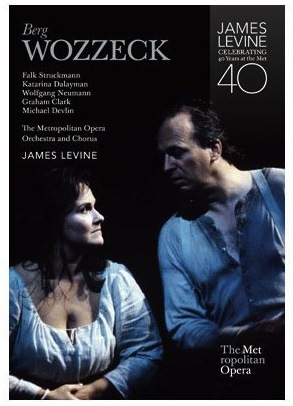There is something weighty about this performance, in a good way. Every piece of it seems to drop into place with a kind of solid inevitability.
 The Met’s production is mostly shadows and empty space. Or rather, space that is at once empty and confined. The characters’ drama plays out between high, featureless gray walls, which turn red for the murder scene. There are a few pieces of furniture – a barber’s chair, a cabinet in the doctor’s room, a bed and chair at Marie’s house – but these isolated objects are there as much to make the bareness more apparent as to put anything in it. Some elements are downright creepy: in the scene in which Wozzeck is unable to sleep, the other soldiers are stretched out in their union suits on the floor, not like people sleeping, but flat on their backs with their feet pointed up, like bodies prepared for burial. The scene at the beer garden, when people are drunk and dancing, has a horrific, ghoulish sense of absurdity to it.
The Met’s production is mostly shadows and empty space. Or rather, space that is at once empty and confined. The characters’ drama plays out between high, featureless gray walls, which turn red for the murder scene. There are a few pieces of furniture – a barber’s chair, a cabinet in the doctor’s room, a bed and chair at Marie’s house – but these isolated objects are there as much to make the bareness more apparent as to put anything in it. Some elements are downright creepy: in the scene in which Wozzeck is unable to sleep, the other soldiers are stretched out in their union suits on the floor, not like people sleeping, but flat on their backs with their feet pointed up, like bodies prepared for burial. The scene at the beer garden, when people are drunk and dancing, has a horrific, ghoulish sense of absurdity to it.
The performances are individually and collectively great. Graham Clark as the Captain does not sound shrill, but he gives an impression of shrillness – all those sweeping up and down high notes – which balances perfectly on the edge between ridiculous and nightmarish. Katarina Dalayman captures the sad limitations of Marie’s life, but does not make her seem weak, or too passive; the moment when she goes off with the drum major, who has been hitting her and shoving her around, is somewhere between resignation, resentment and a little flicker of interest. Her voice communicates the intensity of Marie’s feelings but also their relative simplicity – Marie does not really have the luxury of subtle introspection, and too much introspection would be out of place here. Finally, I thought Falk Struckmann as Wozzeck was terrific. He makes Berg’s torturous-sounding phrases convey both a sort of not-all-there powerlessness as well as anger that’s at once violent and unfocused. The tragedy of Wozzeck’s situation is that for all he’s aware of how the powerless in society are treated, he has no idea who he ought to be angry at. You feel for his situation more than you do for the character himself. This is a set of performances that are compelling both individually and in relation to one another.
But oddly enough, some of my favorite parts of this were the orchestral interludes between the scenes. Levine and the Met’s orchestra did themselves proud with this one. There is a clarinet solo in I think the first of these interludes that I thought was wonderful – just a short line that falls in a series of brief notes, that sound both smooth and heavy. And there are moments from both a solo cello and solo violin later on that were very vivid and beautiful as well. (‘Beautiful’ is a hard word to use about Berg’s music, but it’s worth saying that ‘beautiful’ is distinct from ‘pretty.’)
So. I’m not sure that 100 minutes of violence and atonality is necessarily the most auspicious way to begin a new year, but – well, there it is.
It doesn’t surprise me that the orchestral playing is very good. Levine has really championed Wozzeck at the Met so I’d expect the orchestra to be well schooled. Why it hasn’t had an HD broadcast is a mystery to me. It’s been performed quite often and with strong casts.
LikeLike
I’ve got a Met Lulu on my pile as well, with Levine conducting – based on how Wozzeck sounded, I’m looking forward to it.
LikeLike
I remember they’d toned down the stage business from the previous year — maybe because it was a different cast, or maybe because they were taping it for PBS and didn’t want to ruffle congressional arts-funding feathers. Then of course the whole thing got shelved anyway, but we’ve talked about that before I think.
I’m not sure this production would translate well to HD, because the lighting is kind of key. (Not that that’s ever stopped them before, of course.) Also, when they do this opera, they tend to do it in extremely short runs — usually two or three performances — which doesn’t leave them a lot of time to get their camera act together, and they would really need to have their camera act together.
LikeLike
What did they tone down?
LikeLike
As I remember it, Marie and the Drum Major making use of a convenient wall.
Also, the way Franz Hawlata’s Doctor just s-t-r-o-l-l-l-e-d off as Wozzeck was drowning, swinging his cane and probably whistling, silhouetted against the blood red moon…that was seriously freaky. Missed that the second time around.
LikeLike
In an ideal world, all performances of all operas ever would be available . . . somewhere. Wish I could have seen the non toned-down version of this one. Ah, well.
LikeLike